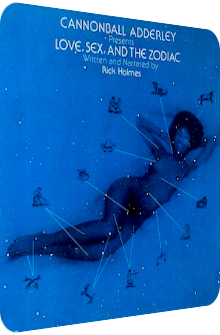
Cannonball Adderley Presents
Love, Sex, And The Zodiac
1974
While Love, Sex, And The Zodiac by saxophonist and composer Julian “Cannonball” Adderley (1928–1975) is already recorded in 1970 in California’s ever-sunny Berkeley, the album, for some weird reason, only sees its release a whopping four years later. In 1974, the marketing team of Fantasy Records finally decides to pick this 13-track opus zodiacus up. A concept album dedicated to the twelve zodiac signs (with an additional introductory track thrown in), Cannonball Adderley and his men create a synergetic Jazz/Funk epithelium that is aglow with crescent clavinets, sub-zero electric piano prongs, alto saxes and cornets, guitar granulomas… and sex, sex, sex.
There is a reason that this album remains in limbo for so many years after all, although one shouldn’t necessarily blame the sex itself – for things sell better with sex – but narrator Rick Holmes who visits every track and shares an adage or two with the listener, prosaically delineating what love and sex really mean to men and women who carry a certain zodiac along with them. Rick Holmes’ attitude can best be described in his own words that occur during the album’s journey: "In every human there is the need to feel important." In this case, Holmes thinks of himself as the supernova, outshining every other instrument. The personnel meanwhile consists of saxophonist Cannonball Adderley, his brother Nathaniel "Nat" Adderley on the cornet, drummer Roy McCurdy, bassist Walter Booker, pianists and synthesists Jimmy Jones, Hal Galper and George Duke and guitarist Walter Booker. All songs are unique and specifically written for this album. Can they keep the listener’s interest despite a pesky – and occasionally funny – narrator?
"Do you need sex more than love, or love more than sex?" This pressing – and in the 70’s: quite daring – question is asked by narrator Rick Holmes in the album’s Introduction whose sleazy, faux-solemn coverage of the topic is grafted onto Jimmy Jones’ acoustic piano which resembles the laid-back formula of a rubicund suntrap situated in the Bronx. And that’s basically it. The band still warms up and starts the concept properly with Aries: Damn Right. Written by George Duke, the song surprises with a golden-lactic haze within Jimmy Jones’ piano aorta, carefully accentuated by Cannonball’s alto sax. "Sounds harsh to say but you need sex more than love," is Rick Holmes’ principal contribution in this 6/8 corker of uplifting vibes, but so be it. Walter Booker’s Taurus: Wampus Cat meanwhile is a clear-cut Funk fest with prolonged interstices between Booker’s own electric guitar cauterization. His riffs merge with George Duke’s clavinet and thus make this a mercilessly desiccate anhydride.
Coming up next: Cannonball Adderley’s and Jimmy Jones’ Gemini: Ecstasy, a long-form piece in the given surroundings of over four minutes. It is a nocturnal ode sans percussion, comprising anything else but the bandleader’s alto sax and the pianist’s effulgent stardust-coated chords. Rick Holmes is all too happy to find "the meaning of live and the meaning of love and sex" in this quiescent piece. Nat Adderley’s Cancer: All Sides follows suit and almost crosses the four minute threshold as well. Similarly dreamy at first, with Walter Booker’s double bass and Nat’s cornet in the limelight, the song opens up and for the first time gives in to the archetypal cosmos coruscation that blesses the Funk genre more often than not: synth sparks, vibraphone droplets, electric piano icicles altogether widen the scope, revving up the orthochromatic gamut. Hal Galper’s Leo: Rosebud finishes side A with the second bone-dry raggamuffin where calcined clavinets, metropolitan horns and viscid electronics gyre around the narrator’s wisdom: "the best thing for you is to shhhaaare your love." Spot on, eh?
Hal Galper rounds off side A and starts side B: the slow-mellow synergy of Virgo: For Pam are ablaze with caproic iterations of smoothened brass layers, viridian piano scintillae and cautious bongo blebs on the way home, all the while drummer Roy McCurdy’s Libra: Patricia turns out to be a wondrous appendix. Played in Bossa Nova style, the various glaucous ingredients become entangled in a lucent superfluid that cajoles the ears. It’s lift muzak in the end, but with a polyfoil capaciousness. A triptych of Nat Adderley follows: while Scorpio: Back “A” Town is a Dixieland-esque downbeat ablaze with sunlight and down to earth, Sagittarius: West Texas is the faster-paced piano-driven sunlit addendum which neglects the synthetic Funk ingredients altogether, with Capricorn: The Gentle serving as the tryst between double bass vesicles, electric pianos and contemplation. The Adderley Bros.’ Aquarius: Humanity Plus is the turbulent turmoil of heavily entangled melodies played in quick succession, strongly jazzy, wildly helicoidal, somewhat akin to John Klemmer’s great Waterfalls (1972), eventually leadig to Nat Adderley’s finale Pisces: Allison’s Trip, the slowest hexangular quilting of the whole album. Ice flowers, scrimshaw clavinets and vernal saxes round off a pluvial sanctuary.
Love, Sex, And The Zodiac is a bedazzling affair, an amalgamation of Cannonball Adderley’s Bebop roots and the endeavor to transplant these stylistic tidbits into a fresher approach that is deemed more relevant in the 70’s. One shouldn’t pan this album entirely, nor is it wise to ridicule this work as an “epiphanic” concept album right from the get-go. The biggest flaw could be its greatest achievement at the same time, depending more strongly on the listener than ever. I’m obviously talking about the slick performance of narrator Rick Holmes who guides the listener through the phylogenetic galaxies of Funk and the occasional verglas avulsion made of Jazz. Naturally, there are two sides of this iridescent coin: either one enjoys the parochial wisdoms of the even narrower agenda and absorbs the 78 appearances of the terminus sex with all its related radicals and stems, or one sees him- or herself confronted with the fact that the unique songs and little melodies are honestly enjoyable… only to be subsequently destroyed by Holmes’ alkaloidal lariats and toasts.
Indeed, there is not one single instance where he doesn’t appear, a maximum of two minutes is given where he remains mute. I cannot vouch for the album’s success or failure per se, but would rather link the stylistic technique of this LP to a Space-Age classic where the constant narration actually works: Attilio “Art” Mineo’s Man In Space With Sounds (1959) is recorded in advance for the Seattle State World’s Fair that takes place in 1962. Here, the concept is fantastically realized, with the over-the-top narrator becoming a boon in lieu of a burden. Whether Rick Holmes destroys Love, Sex, And The Zodiac is for him to know and you to find out. Available on LP, CD and as a download.
Exotica Review 414: Cannonball Adderley – Love, Sex And The Zodiac (1974). Originally published on Feb. 14, 2015 at AmbientExotica.com.
